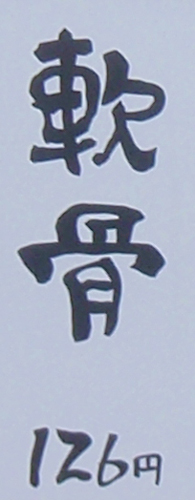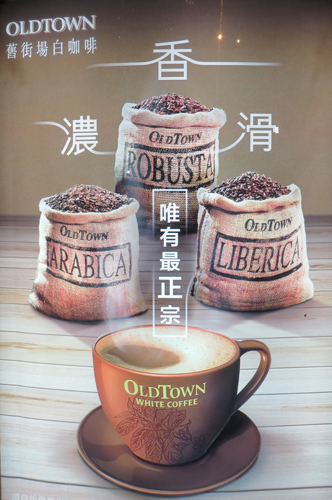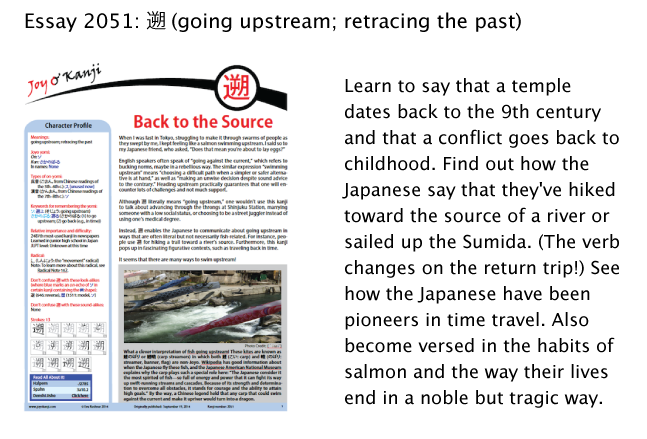Wet Bones
What do you think you get from wet bones? That is, 滑 breaks down as 氵(water) + 骨 (bone). What about dem bones? Here are your choices:
a. mortar
b. plaster
c. sliding
d. dissolving
I'll block the answer with a photo of bones (or at least of the bone kanji).
❖❖❖

Photo Credit: Eve Kushner
A Niigata restaurant offers 軟骨 (なんこつ: cartilage), which breaks down as soft + bone. Cartilage is soft bone?! That's fascinating, but is it true? Well, yes and no. As a creature matures, cartilage turns to bone. But the restaurant probably isn't serving an aged animal. Coincidentally, I ate barbecued cartilage the last time I was in Japan. My dinner companions said we simply had to order it, but I was skeptical, and I should have been. Of all the delicious things to eat in the world, why would you resort to that crunchy bit of tastelessness?
❖❖❖
Okay, here's the answer:
c. 滑 means "to slide, slip; smooth, slippery." One reads 滑り as すべり, which is wonderful because that sounds a lot like "slippery"! Oh, and this kanji can have the on-yomi of コツ, just as 骨 can, providing a beautiful example of the on-echo.
I mention 滑 because my language partner kept using it recently in this intriguing word:
滑り止め (すべりどめ: (1) tire chains; anti-skid device) sliding + stopping
This term has some logical literal definitions, but the fun always starts with colorful figurative interpretations. What do you think this word means as a metaphor?
a. intervention to help someone struggling with addiction
b. entrance exam for a school one views as a backup choice
c. device to prevent stockings from sliding down the legs
d. sticky mat used in yoga
This time I'll block the answer with things you may not have realized about 滑.
❖❖❖
Did You Know ...?
• The word 水滑り台 (みずすべりだい: water + sliding + platform) means "water slide." This makes perfect sense when it comes to 水滑り, but I didn't expect to see 台 in this context. Incidentally, 滑り台 means "slide."
• It's no surprise that 滑り (すべり) means "sliding; slipping." However, it's startling to find that 滑り with the yomi of ぬめり means "slime; mucus; sliminess; viscous liquid." That's slippery, all right! People tend to write ぬめり in hiragana, which is a good idea. You want to be clear whether you mean "sliding" or "slime"!
• Japanese people often use 滑り to mean "skiing," "snowboarding," or "skating." Take, for instance, this term:
氷滑り (こおりすべり: ice skating) ice + sliding, skating
The following statement comes from a 2010 interview with an Olympic snowboarder:
本番で自分の滑りをしたいとしか考えていない。
My only concern is that I want to give my own performance when it counts.
本番 (ほんばん: game; crucial moment); 自分 (じぶん: myself); 考える (かんがえる: to think about)
With "when it counts," he was referring to the Olympics.
❖❖❖
Here's the second answer:
b. 滑り止め (すべりどめ: sliding + stopping) means not only "(1) tire chains; anti-skid device" but also "(2) entrance exam for a school one views as a backup choice." If you ace this exam, it's a sure thing to get into that high school or university. If you fail it, though, the verb 滑る (すべる: to fail an entrance exam) conveys that in a colloquial way. Thus, you need a 滑り止め, which will theoretically prevent you from sliding down into a life of complete failure and misery! To put it another way, the test keeps your future from slipsliding away.
One finds 滑り止め inside the following spinoff term:
滑り止め高校 (すべりどめこうこう: backup high school)
entrance exam for a backup school (1st 2 kanji) + high school (last 2 kanji)
How sure a thing is a backup school? That partially depends on your mindset while taking the entrance exam. The following term refers to a dangerous attitude for a test taker to have. What do you think it means?
上滑り (うわすべり) above + slipping
a. desperate
b. cocky
c. careless
d. dishonest
I'll block the answer with the etymology of 滑.
❖❖❖
Henshall says that in 滑, the 骨 acts phonetically to express "emerge." This component may also lend the idea of "flexibility," as well as "smoothness," thanks to its association with the backbone.
Putting together 氵and 骨, we find "water emerging (maybe smoothly)," which is to say "flowing," which suggests "sliding" or "gliding." That extends neatly to "slip" and "slippery."
With so much slipperiness, it's no wonder one definition easily extends to another!
❖❖❖
Here's the answer:
c. 上滑り (うわすべり: surface + slipping) means "careless." I've changed the breakdown to reflect the meaning of 上 here. According to dictionaries, 上滑り literally represents a smooth, slippery surface. Figuratively this word refers to an inability to delve into the core of an issue. Because one "slips or skates on the surface," the definition is "careless," though the term primarily means "superficial, shallow."
I'm intrigued that the English term "slipping up" also involves slipping and carelessness.
Did you notice, by the way, that we need to read 上滑り with the melodic kun-kun combination うわすべり? I rarely see the yomi of うわ for 上. This yomi has brought us beneath the surface, giving us a deeper understanding of 上!

Photo Credit: Eve Kushner
In this Hong Kong sign, the 滑 tells us that the coffee slides down the throat easily. In Chinese 滑 also means “to slide” or “slippery."
I'll leave you with another intriguing 滑 word:
滑り出し (すべりだし: start; beginning) sliding + start
Given the breakdown, does this mean "sliding back to the start"?! People don't actually use it that way, but if you do want to talk about going back to the start, the newest essay provides the perfect words for that. Here's a sneak preview:

Joy o' Kanji will take a brief vacation. Have a great two weeks!

Comments